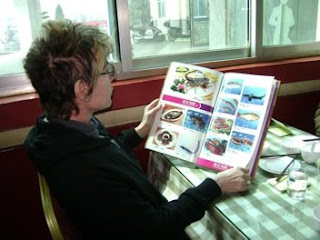Barb has been keeping busy during her visit. On Friday we visited Dengfeng City. We went to one of the oldest Buddhist temples in China, nestled into the mountains. Barb thought the setting was just like the Chinese art she studied in college. We even saw a few foreigners and so unused am I now to other Westerners that I was staring at them as much as the Chinese. I refrained, however, from taking their pictures.

We spent the late afternoon at the famed Shaolin Temple where kung fu was developed. It's probably the biggest tourist attraction in Henan province but the demonstration was still cool! Ya gotta like a guy breaking a sword over his head and another throwing a pin through a ballon and a piece of glass.
 Saturday was a wedding feast! Jackie Chan is the liaison for us foreign experts and his new bride Poppy (English name) is in my graduate philosophy class. Wonderful couple and they welcomed us like family.
Saturday was a wedding feast! Jackie Chan is the liaison for us foreign experts and his new bride Poppy (English name) is in my graduate philosophy class. Wonderful couple and they welcomed us like family. The hosts must lay on a sumptuous and plentiful spread so that no guest goes away hungry. Better Chinese restaurants usually have a large dining room on the first floor and a number of rooms on the second where people can eat in a relatively quiet atmosphere. Jackie & Poppy had the entire floor for their banquet. Naturally there were numerous toasts and much bai jo (Chinese whiskey) consumed. Jackie doesn't like to drink but by the time he made it to our room for his third visit he was pretty unsteady. "Five uncles!" he complained, and by tradition they wanted to ensure he was man enough to marry their relative by seeing if he could hold his whiskey. No way the groom can refuse a toast! We lightened him up by the special performance of a rap we had prepared.
The hosts must lay on a sumptuous and plentiful spread so that no guest goes away hungry. Better Chinese restaurants usually have a large dining room on the first floor and a number of rooms on the second where people can eat in a relatively quiet atmosphere. Jackie & Poppy had the entire floor for their banquet. Naturally there were numerous toasts and much bai jo (Chinese whiskey) consumed. Jackie doesn't like to drink but by the time he made it to our room for his third visit he was pretty unsteady. "Five uncles!" he complained, and by tradition they wanted to ensure he was man enough to marry their relative by seeing if he could hold his whiskey. No way the groom can refuse a toast! We lightened him up by the special performance of a rap we had prepared. 
The newlyweds' reaction is our best review.

Sunday Professors Guo Shangxing, Xue Yufeng, Barb, and I went to Zhuxianzhen, a small town 22 kilometers south of Kaifeng. It has a temple dedicated to national hero Yue Fei. The statues above commemorate the capture of the five assassins who took his life. The town also boasts a fine old mosque.
 Zhuxianzhen is famous for woodcuts. We stopped at a shop and watched the artisans at work. Naturally we did not leave the town empty-handed. Back in Kaifeng we met more friends for a great feast. Did I mention that the Chinese love to eat?
Zhuxianzhen is famous for woodcuts. We stopped at a shop and watched the artisans at work. Naturally we did not leave the town empty-handed. Back in Kaifeng we met more friends for a great feast. Did I mention that the Chinese love to eat? Our day was not yet done—nor were our culinary adventures. Livia, one of my junior students, had invited us to dinner at her parents' apartment Sunday evening.
Our day was not yet done—nor were our culinary adventures. Livia, one of my junior students, had invited us to dinner at her parents' apartment Sunday evening. Her mother taught Barb how to make jiaozi and baozi (dumplings boiled and steamed).
Her mother taught Barb how to make jiaozi and baozi (dumplings boiled and steamed). She spoke no English but Livia could translate and at any rate the international language of the kitchen held sway. Livia's mother is a terrific cook and we marveled at the spread she laid out using one burner. No oven, no stove, just a hotplate. Amazing!
She spoke no English but Livia could translate and at any rate the international language of the kitchen held sway. Livia's mother is a terrific cook and we marveled at the spread she laid out using one burner. No oven, no stove, just a hotplate. Amazing! We had a great time, I never thought I 'd hear Barb claim that she can barely face another feast! But Monday was another day...
We had a great time, I never thought I 'd hear Barb claim that she can barely face another feast! But Monday was another day...






 The Chinese students do many outings with their classes. I was invited on the spring outing for the Foreign Language postgraduates (grad students in the USA) and was happy to accept, especially since it was my first visit to the Yellow River. The Huang is called the Mother River since Chinese civilization first grew up around it.
The Chinese students do many outings with their classes. I was invited on the spring outing for the Foreign Language postgraduates (grad students in the USA) and was happy to accept, especially since it was my first visit to the Yellow River. The Huang is called the Mother River since Chinese civilization first grew up around it.